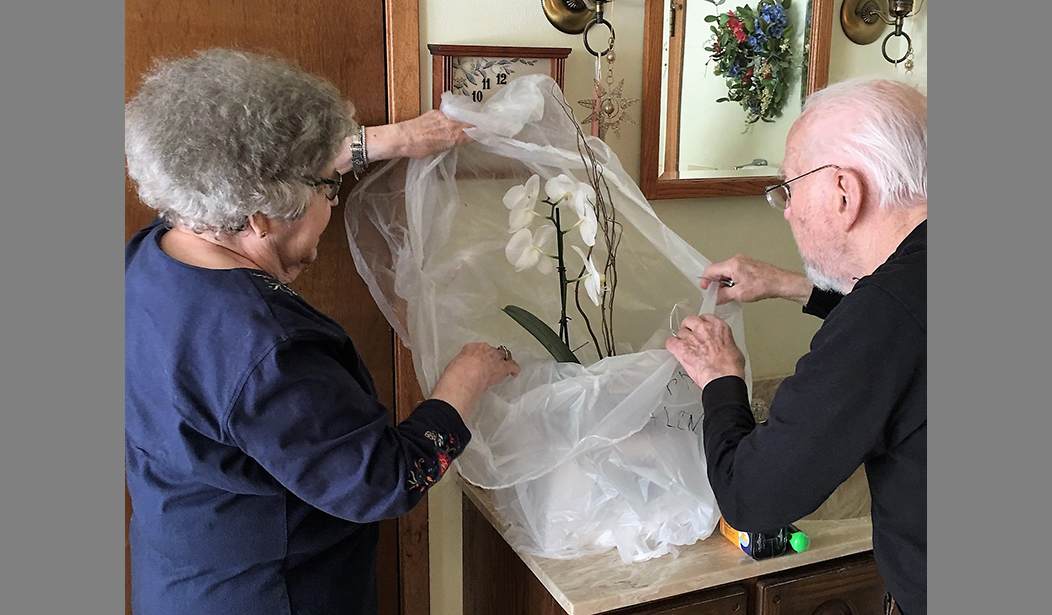As I grow older, I realize that in many ways, the person I was closest to in my life, second only to my wife, was my father. In some ways, I was closer to Dad than even my kids. For as long as he lived, I never made a significant decision on anything - life, purchases, careers, anything - without talking to him to see what he thought. He had magnificent judgment. He was a wise, thoughtful man, self-educated, well-read, a man of great determination and iron will.
Dad's been gone for seven years. I still think of him every day - every single day. There are times when I see, read, or hear something, even now, and think, "Oh, wow, I have to tell Dad about that." Seven years, and I'm still getting accustomed to that great empty place in my life where a giant once walked. Mom has been gone for almost as long; she didn't last long after Dad died, being over 90 and with her husband of 71 years gone, and I think of her every day, too; she who showered her family with love. I remember her strength, her kindness, and her grit.
And, less than two years after the folks passed, my siblings and I had another shock when our sister died of cancer.
There are times in our lives when we have to face things like this. It's inevitable. It will always happen, throughout our lives: Grandparents, parents, siblings, friends. The two inevitabilities in life, after all, are death and taxes, and we cannot forever evade either.
But some tech companies, in a sort of digital necromancy - or perhaps a better term would be necroscopy - are trying to give us a workaround, for a price. The Free Press's Peter Savodnik, in a recent article, describes one such.
A week after we buried my grandmother, I had a dream that she and I had dinner at a Chinese restaurant in Midtown Manhattan and she gave me advice about my love life, which was odd, because she had never done that before.
I have been thinking about this dream ever since I learned of this new app called 2wai, which is apparently pronounced 2-way and enables “real-time, two-way conversations” with so-called HoloAvatars—including dead people. (Its website is a little coy about this, but a recent 2wai ad, which features a little boy named Charlie who grows up speaking with a grandmother he’s never met, is not.) “Human connection, reimagined in the age of AI,” the website promises.
If you’re wondering how this will work, wonder no more. We know. Many AI companies are already experimenting with creating fake friends out of dead loved ones.
This isn't a personal connection. It's not a two-way conversation; it's a chatbot. In this horribly cynical advertisement, the little boy, Charlie, is not speaking with his grandmother. There is no human contact in this. It is, simply, not.
I'm not a psychiatrist, nor do I play one on television. But this strikes me as being not only unhealthy, but a cynical manipulation of vulnerable people in a time of grief. And, before you ask, yes, I think the same thing of some unscrupulous funeral directors, selling families thousand-dollar polished wood caskets that will be put in the ground, never to be seen again. But at least with a fancy casket, the buyer is getting something tangible, not just pixels on the screen.
These things are cruel and exploitative fakes. Nothing more.
Read More: AI Apps Have Been Created to Pretend to Be Jesus and Churches Are Playing Along
The AI Program That Won't Let You Rest in Peace Has Arrived, and It's Horrifying
Now, do I favor some legislative prohibition? No. For one thing, I'm pretty sure it would be unenforceable. It would be the same as all the plans on the internet for things like 3D printer specs for gun parts, or AI animation apps. That genie is out of the bottle, and it ain't going back. Also, it's not the role of government to protect people from the consequences of their bad decisions, and this would surely be a bad decision, but it's one people are free to make. After all, life is full of dumb things people can waste money on. Of course, one could make the argument that this kind of thing can and likely will lead to all kinds of social pathologies, like a chronic denial of that final end that comes to us all - it pushes back that ultimate realization that hits us all, sooner or later.
Last summer, our oldest daughter and her husband came to Alaska, as they do most years, for some fishing. She was very close to her grandparents, as all our kids were. She told me something I've thought about myself: "I think I'd give a year off my life to spend one day at Bear Creek with Grandma and Grandpa," she said.
It's an understandable, if impossible, wish, and even if it were possible, it would come with a horrible price. "But at the end of that day," I told her, "you'd just have to say goodbye all over again."
How we deal with death is at least as important as how we deal with life. We rail against it, we grieve when it happens, some of us rend garments and weep, some shout our grief to the sky. Some of us suffer in stoic silence. But face this we must, and we should not be taken in by something like these programs, these fakes, these dodges, these frauds.














